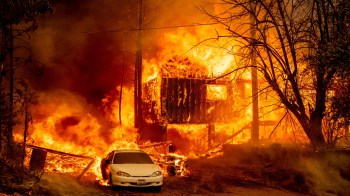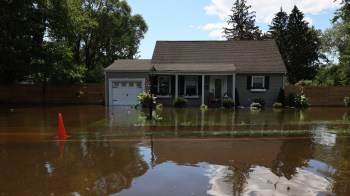Who will pay for climate change? Not us, insurer says
Climate change is shaping up to be really expensive. So who picks up the tab? That’s the issue in a lawsuit filed recently by Farmers Insurance against Chicago and its suburbs.
A big two-day rainstorm hit the Chicago area in April 2013. Sewers backed up into hundreds of homes. Some people had to leave their homes. Clean-up was a nightmare.
The company wants local governments to pay for damages, and experts say this marks the beginning of a trend.
Andrew Logan looks at the insurance industry for Ceres, a non-profit that coordinates private-sector efforts to address climate change.
“I think what the insurers are saying is: ‘We’re in the business of covering unforeseen risks. Things that are basically accidents,’” Logan says. “‘But we’re now at a point with the science where climate change is now a foreseeable risk.’”
That would make local governments liable, in theory, for not upgrading their stormwater-management systems to account for that risk.
Legal experts say this theory faces an uphill fight. Very strong legal doctrines protect governments in these kinds of cases, says attorney James Bruen, a partner at Farella Braun + Martell LLP.
“They can say, ‘You can’t second-guess us on that,’” says Bruen. “‘We have to make a decision politically about where to put our services, and just because you don’t have as many services as you’d like is not a basis to sue us. Sorry.’”
So, why bother filing this kind of suit?
“It’s the lottery,” Bruen says. In other words, the cost of the ticket— filing the suit— is nothing compared to the potential payout: Getting off the hook for climate-related liabilities.
Insurers may also hope lawsuits will influence future government decisions. “They want to put cities on notice that they’re not going to walk away quietly,” says Robert Verchick, who teaches environmental law at Loyola University in New Orleans.
“Even if a city is likely to win a lawsuit, it still is going to have to spend quite a bit in defending itself,” he says. “And it might just be better for everybody involved for cities to take climate change seriously.”
Michael Gerrard, who runs the Center for Climate Change Law at Columbia University, says he’s been waiting to see a lawsuit like this for a long time.
“There will be many such lawsuits,” says Gerrard. “Some against governments, some against private entities. Often, insurance companies will be in the mix, and we’ll see who pays what.”
For instance, he says, architecture firms could become targets. “If someone designs a building and the building doesn’t survive a foreseeable storm, is there malpractice liability on the part of the architect or the builder?”
There’s a lot happening in the world. Through it all, Marketplace is here for you.
You rely on Marketplace to break down the world’s events and tell you how it affects you in a fact-based, approachable way. We rely on your financial support to keep making that possible.
Your donation today powers the independent journalism that you rely on. For just $5/month, you can help sustain Marketplace so we can keep reporting on the things that matter to you.


















